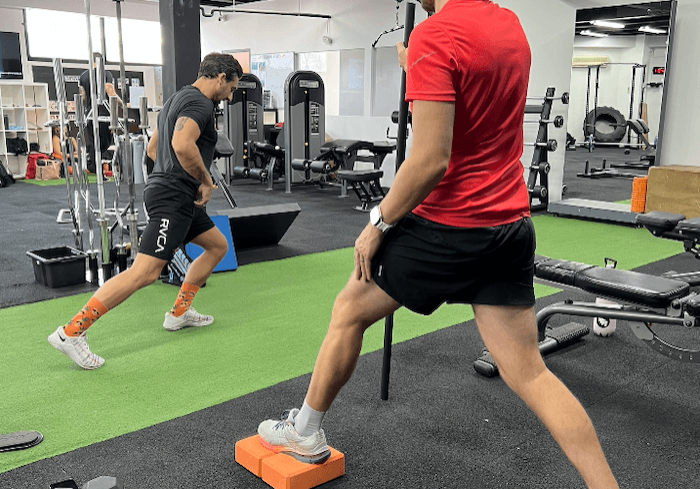The Importance of Setting Smarter Diet Goals for Your Fitness Journey

As a personal trainer in Dubai, I know that one of the most important aspects of achieving your fitness goals is having a proper diet plan in place. While it may be easy to set a goal to "lose weight" or "eat healthier," these goals can often be too broad and lack specific direction. That's why it's crucial to set smarter diet goals that are tailored to your individual needs and priorities.
SMARTER DIET GOALS
Assessing Your Current Eating Habits
Setting Specific and Measurable Goals
PRIOIRITIZE YOUR GOALS
Creating A Meal Plan
TAKING GRADUAL STEPS
Assessing Your Current Eating Habits
The first step in setting smarter diet goals is to assess your current eating habits. Take a look at what you're currently consuming on a daily basis and identify any areas that need improvement. Are you consuming too many processed foods? Not getting enough fruits and vegetables? These are the types of things to consider when setting your goals.
A study entitled "Comparison of Weight-Loss Diets with Different Compositions of Fat, Protein, and Carbohydrates" by Sacks, et al, published in the New England Journal of Medicine in 2009 found that a diet that included a moderate intake of carbohydrates, lean protein, and monounsaturated fats led to greater weight loss than a low-fat diet. The study also found that the moderate carbohydrate, protein and monounsaturated fat diet resulted in improved cardiovascular risk factors.
Two other studies also show similar results; "The role of diet in weight management" by Dhillon, et al, published in the British Journal of Nutrition in 2015 reviewed the current literature on the role of diet in weight management and found that a balanced diet that includes a variety of nutrient-dense foods from all food groups, in appropriate portions that meet an individual's daily energy needs, leads to weight loss and improved overall health.
"The effect of a plant-based diet on plasma lipids" by Ornish, et al, published in the Journal of the American Medical Association in 1990. This study found that a plant-based diet that emphasizes whole, nutrient-dense foods leads to weight loss and improved cardiovascular health, as well as lower levels of LDL cholesterol, compared to a diet that includes animal products.

Setting Specific and Measurable Goals
Once you have a clear understanding of your current eating habits, it's time to set specific and measurable goals. Instead of just saying "I want to eat healthier," set a goal to add one serving of fruits or vegetables to each meal or reduce your daily sugar intake by a certain amount. These specific and measurable goals will give you a clear direction and make it easier to track your progress.
Prioritizing Your Goals
It's important to prioritize your diet goals to ensure that you're focusing on the most important changes first. If you're trying to make too many changes at once, it can be overwhelming and make it difficult to make any progress. Prioritize your goals by identifying the ones that will have the biggest impact on your overall health and well-being and focus on those first.
Creating a Meal Plan
Creating a meal plan for weight loss can be a great way to ensure that you're getting the right balance of nutrients while also reducing your overall calorie intake. Here are some strategies to employ when creating a meal plan for weight loss:
- Nutrient-dense foods: Instead of cutting out entire food groups, focus on incorporating more nutrient-dense foods into your diet such as fruits, vegetables, whole grains, lean proteins, and healthy fats. These foods are not only packed with nutrients, but they also help to keep you feeling full and satisfied.
- Portion sizes: One of the most effective ways to reduce calorie intake is to be mindful of portion sizes. Use measuring cups and a food scale to ensure you're consuming appropriate portions of each food group.
- Planning: Plan your meals and snacks in advance to ensure that you're always prepared with healthy options. This can help you avoid impulse eating and make healthier choices when you're on-the-go.
- Protein: Protein is an important nutrient that helps to keep you feeling full and satisfied. Make sure to include a source of protein in every meal, such as chicken, fish, eggs, beans or legumes.
- Stay hydrated: Drinking enough water throughout the day can help you feel full, reducing the chance of overeating. Aim for at least 8 glasses of water per day.
- Stay flexible: Remember that weight loss is a journey, and it’s important to be flexible with your meal plan. If you slip up and have a less-than-ideal meal, don't beat yourself up about it. Just get back on track with the next meal.
It is important to note that creating a meal plan for weight loss should always be done in consultation with a healthcare professional and a registered dietitian as they will take into consideration any medical conditions, allergies or other factors that may affect your plan.

Making Gradual Changes
It's important to remember that changing your diet is a process and it's not something that can be done overnight. Rather than trying to make drastic changes all at once, it's better to make gradual changes over time. This will make the process less overwhelming and more sustainable in the long run.
Getting Support
Making changes to your diet can be challenging, and it's important to have the support of others. Consider working with a registered dietitian or a nutritionist to help you reach your goals. You can also reach out to friends and family for support and accountability.
Staying Flexible
Lastly, it's important to stay flexible with your diet goals. Life happens, and there will be times when you may not be able to stick to your plan perfectly. It's important to not be too hard on yourself and to adjust your goals as needed. Remember, the most important thing is that you're making progress towards a healthier you.

IN CONCLUSION
Setting smarter diet goals is crucial for achieving your fitness goals. By assessing your current eating habits, setting specific and measurable goals, prioritizing your goals, creating a meal plan, making gradual changes, getting support, and staying flexible, you can ensure that you're on the right track to reaching your diet goals and improving your overall health and well-being.

